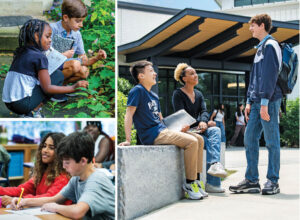In Lower School Science Teacher Rasheeda Murphy’s classroom, the motto is “Cogito, Ergo Sum” or “I think, therefore I am.” Along with all of her fellow AFS educators, she fosters a lifelong love of learning and creativity in her students. However, her ambitions are unique, in that the school’s youngest children are empowered to find joy in touching worms and bugs, digging in the dirt, and exploring mold and fungus. Not every student comes to Rasheeda’s classroom with an innate love of science or the outdoors, but they develop a respect for the nature outside their classroom walls through her careful guidance and encouragement.
Rasheeda says, “I feel like the students are comfortable enough to trust me and then they learn how to trust themselves—to think out loud and explore outcomes to different activities. I often don’t expect them to complete a task in an exact way, and there’s never a time when I say, ‘No, this isn’t right.’ However, I do encourage them to dig deeper and find avenues to discover the answers to their questions. The goal of lower school science is to foster a love of science.”
Rasheeda also heads the Center for Experiential Learning’s “AFS Outside,” which is a school-wide outdoor learning program designed to connect children in sustained and meaningful ways with the living-world while fully realizing the enormous potential of the AFS campus. “AFS has invested in making sure students have certified outdoor classroom spaces available for regular classroom teachers to utilize as alternative learning spaces in order to encourage our students to embrace the outside environment,” says Rasheeda. Students in Rasheeda’s classes, which range from kindergarten to fourth grade, explore the school’s science garden and walk through the campus arboretum and along Jenkintown Creek, which runs behind the school. Students discover many creatures and environments that are unfamiliar to them in this explorative learning, especially the youngest students. Rasheeda explains, “I introduce the students to being naturalists and embracing their ability to learn about the many unknowns in our environment. I encourage those students who are afraid to touch bugs to touch bugs and I encourage students who are afraid to get wet to put on their rain boots and jump around in puddles.”
During the 2018-2019 school year, Rasheeda and her classes noticed a family of carpenter bees living outside the door to the science garden. A few students refused to walk out of that door, so Rasheeda decided to create a bulletin board about bees that included specimens and information about insects. Students were able to see many of the bees that they are most afraid of close-up and learn whether they are aggressive or not. After that, students began to identify the bees they encountered and because they knew their habits, they were less apprehensive to be around them.
Part of Rasheeda’s desire to join the faculty at AFS was her passion for inquiry-based discovery learning. She’s carried this passion into her classroom and explains that she teaches students, “the importance of asking ‘Well, how do you know?’” She says, “Asking for proof is okay because there’s a difference between a thought, a theory and a law. It can’t be a law until it’s absolutely proven true. My students are able to think critically about big questions and break the questions down according to what they already know.”
AFS students come to the classroom with a wealth of scientific knowledge. Rasheeda says, “They’ve read a lot of books about science, watched the Discovery Channel and other documentaries, and visited museums both near and far.” She says, “A student might bring a question to class that is very broad. I may be the first teacher who has ever had to say to them, ‘I don’t know, but we can research it.’ Then, we can look it up as a class because I’m always willing to learn alongside them.”
Read more about The Power of the Personal in Education in the Winter issue of our Oak Leaves magazine.

